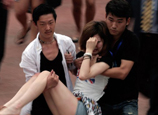
ZHENGZHOU/SHIJIAZHUANG, June 22 (Xinhua) -- Private orphanage owner Yuan Lihai said she will support a new government policy that bans individuals and groups from secretly adopting children, although she refuses to give up the children under her care until she can be sure they will be taken care of.
Yuan received nationwide attention in January after her orphanage, located in central China's Henan Province, burned down, resulting in the deaths of seven children. Her reputation was significantly damaged by the blaze.
The surviving children were sent to an orphanage in the city of Kaifeng, as her home of Lankao County has no orphanages.
"I can't remember when I bought the clothes I wear today, but I can tell every single detail of each of the children I adopted over the past 26 years. I treat them as my own children," Yuan said.
A circular recently issued by the government bans private adoptions, effectively shutting down orphanages like Yuan's.
She has, however, been given permission to visit the children she looked after.
The circular, jointly issued by seven ministerial departments, also includes instructions on transferring, settling and treating orphans, as well as requires individuals or social groups that engage in adoption services to work in tandem with local government and civil departments.
"Child abandonment is a social problem all over the world. Although Chinese law bans such acts, the country's imperfect social security system and limited medical standards lead to abandonment, especially for handicapped children," said Han Jinhong, president of the Social Welfare Institute of Shijiangzhuang, capital of north China's Hebei Province.
China has a significant lack of orphanages and other welfare organizations for children. Religious charities and good Samaritans have tried to step in to fill the void.
Since the government circular was issued, non-governmental organizations and individuals have worried that requiring local governments to participate in adoption procedures may be too much of a burden.
Li Lijuan, a private foster mother like Yuan, has sheltered more than 50 children since 1996 in a remote bungalow in Hebei's city of Wu'an, using her savings and donations from the public to fund her efforts.
Li wasn't happy when she learned that the civil department of Wu'an planned to take her children. Her adoptees were upset as well -- one of her charges ran away from home with 20 other children after he found out that they would be taken away.
"Social adoption agencies have a lot of shortages, including a lack of capital, poor living environments and no professional medical services," said Shen Yihui, a provincial civil affairs official.
"But it is difficult to create a cozy family environment for children who are adopted by the government. It is not healthy for their growth," said Feng Moxi, president of an orphanage in Hebei's Zhaoxian County.
Zhao said the government needs to draw lessons from developed countries, which mobilize all levels of society to participate in adoption efforts.
Qualified civil adoption agencies that are equipped with nursing personnel, medical and education facilities, as well as have signed agreements with their local government, can participate with the government in adoption procedures, according to the circular.
Individuals who meet government standards, sign an agreement with the government and accept the government's supervision can also be approved to adopt, according to the circular.
















 Rehab helps prepare for life after addiction
Rehab helps prepare for life after addiction


![]()
